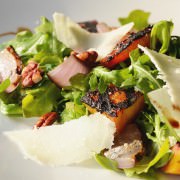How to Host a Better Restaurant Week and Get More Customers
If your restaurant is in Chicago, restaurant week is officially over. The mad rush has ended, your restaurant week customers have left, and if you’re like most restaurateurs, you’re beating yourself up for every little thing you could have done better. Don’t be so hard on yourself. Channel that perfectionist energy into making next year your best restaurant week ever with these five easy-to-follow steps.
And if you’re not in Chicago, use these tips to maximize your success during Restaurant Week.
1. Determine Your Goal in Advance
It is never a good idea to plan your restaurant week offerings last minute. As you know, there are a lot of deadlines to meet, a lot of training to do, and a lot of paperwork and ordering to take care of. Start planning next year’s menu this very second by taking out a piece of scrap paper and writing down five goals you want to accomplish during next year’s restaurant week. Do you want more customers? Do you want to increase your mailing list? Do you want to redo your restaurant’s brand? Do you want to launch a new wine list? Get more online buzz? Come up with five goals and write them down now. (I’ll wait here.)
Done? Good.
Now, look back through that list and circle the best goal you wrote down. Do that now.
After you’ve circled your best goal, tack that piece of paper up in your office, right above your computer. Refer to it throughout your year of restaurant week planning, ‘cause that written goal is your ticket to success.
2. Design Your Menu with Your End Goal in Mind
Now that you have a goal, you’ll want to design your menu to accomplish that goal. Not quite sure what I mean? If your goal was to introduce your new wine menu, or to rebrand yourself as a wine bistro, you’ll want to start planning an irresistible wine-pairing menu. If your goal was to bring in more customers, you should analyze the most ordered dishes from this year’s menu, and plan new variations of them.
Your menu items are most likely the thing that brought your customers in the door, so keep that trend going by offering what they want next year too.
You won’t be able to complete this task as quickly, but you should start thinking about it very soon. In fact, write this step into your calendar on Monday or Tuesday (your slowest day), so that you don’t forget about it.
The reason you need to start doing this as soon as possible is so that you complete this task while you remember the seasonal prices for your ingredients and can plan dishes with the most bang for your buck. Restaurant week takes a lot of upfront capital to manage properly—you won’t want to end up with unexpected ingredient costs next year.
3. Set up your advertising plan
I know I talk about marketing and advertising a lot, but it’s for a good reason. Most restaurants do not advertise enough. This next year, do your advertising the right way, and start early.
A really easy, really cheap way to effectively raise awareness for your restaurant week menu is to promote it like mad on social media. If you aren’t on Twitter yet, or if you constantly tell people you “just don’t get Twitter,” it’s time for you to stop putting obstacles in the way of your own success.
Seriously, restaurant owners, Twitter is awesome (and it’s not that hard).
Post some updates on your account to get customers to follow you. Post every day without the hassle by using an advance posting service such as HootSuite or Buffer.
Once you’ve got an audience, start talking about your restaurant week specials (from that menu you will have planned waaaay in advance).
Get noticed on Twitter by using:
- Hashtags (including your city’s designated restaurant week hashtag)
- Giveaways (for free things during restaurant week)
- Contests (have your guests help you plan desserts or cocktails)
Do this stuff on Facebook too. (I just figure you’re already pretty Facebook savvy, so I didn’t focus on it.)
Don’t let the momentum die as you get closer to next year’s restaurant week. Make sure to keep those contests, giveaways, menu sneak peeks, and other hashtagged bits of information swirling onto your customers’ Twitter (and Facebook) feeds.
4. Drill Your Staff
Did your staff fall a little flat this year during restaurant week? Now is the time to start remedying that. If you noticed specific problems, such as restaurant week menus not being handed out with the regular menus, talk to your staff about that.
Don’t forget to praise them for what they did right.
Your kitchen staff kept up with a ridiculously paced week. You should congratulate them and thank them profusely. Your servers maintained bright smiles, even after crushing turnover rates and low tips. Express how grateful you are for having them be your front line.
As you get closer to next year, make sure that you don’t stress your staff again—schedule people properly to handle the workload next year.
5. Earn Repeat Business
Next year is your time to shine—and keep shining. Restaurant week is a lot of work, but it’s worth it if you build repeat customers. A lot of them. Of course you’ll always want to put your best foot forward during restaurant week, but follow this easy process to earn as much repeat business as possible:
- Invite your customers to fill out surveys so that you can capture their data
- Track the ones who ordered off the restaurant week menu using a specific system code
- Send a thank you deal to your restaurant week customers. You can do this using email, Twitter, Facebook messages, or snail mail, but make sure you do it.
Prepare the Right Way
Remember to keep your goal in mind as you complete your five-step journey toward restaurant week success. If you set a clear goal, design your menu to meet that goal, advertise like mad on social media, prepare your staff, and entice your customers to come back soon, you can be assured that next year’s restaurant week will be a smashing success.
What went wonderfully (or horribly) during your restaurant week? Tell us all about it on Twitter @UncorkdMenus.
Photo licensed by Phil Wood Photo
- Why Your Wine Menu Is Scaring Your Guests - February 27, 2015
- How to Host a Better Restaurant Week and Get More Customers - February 23, 2015
- Choosing Your Restaurant Wine Glass – 3 Approaches - February 16, 2015









